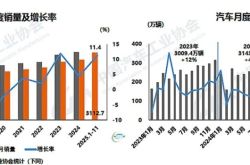Using the "Direct Answer" feature of large AI models, can Zhihu's answers become more reliable?
![]() 07/02 2024
07/02 2024
![]() 619
619
It is not yet perfect, but it is indeed useful.
If AI large models brought an unprecedented shock to everyone in 2023, then in 2024, this shock has inevitably weakened, and the core focus of AI large model competition has shifted to practical applications:
To make more people actually use them.
At the 10th Zhihu Salt Club Youth Conference held a few days ago, Zhihu officially launched a new AI large model product called "Zhihu Direct Answer," which is based on Zhihu's self-trained "Zhihai AI" large model.
However, strictly speaking, "Zhihu Direct Answer" is not new.
As early as March this year at the 2024 Zhihu Discovery Conference, Zhihu actually released the AI feature "Discovery·AI Search." In the official description, "Discovery·AI Search" provides users with a new experience that combines new search, real-time Q&A, and follow-up questions, with trusted content from the community as its source.
This description can basically be applied to "Zhihu Direct Answer," with the difference being that it has shifted from "using trusted content from the community as a source" to "using Zhihu's high-quality content as the core, with multiple data sources as support," and has officially been upgraded from a feature attached to Zhihu to an independent product with an independent domain name (zhida.ai).
But for ordinary users, the more pressing question may be: As an AI large model product, can "Zhihu Direct Answer" truly provide a new way for everyone to obtain reliable information, as claimed by the official? And what advantages does "Zhihu Direct Answer," with Zhihu community content at its core, have over other similar AI search products?
Everything requires "practice to achieve true knowledge."
"AI Search" is just the shell, Zhihu content is the soul
The product design of "Zhihu Direct Answer" is very simple and familiar. In a word, it is an AI search design similar to Perplexity. Many AI search products both domestically and abroad have adopted this design, and the reason is not complicated: it's easy to use and sufficient.
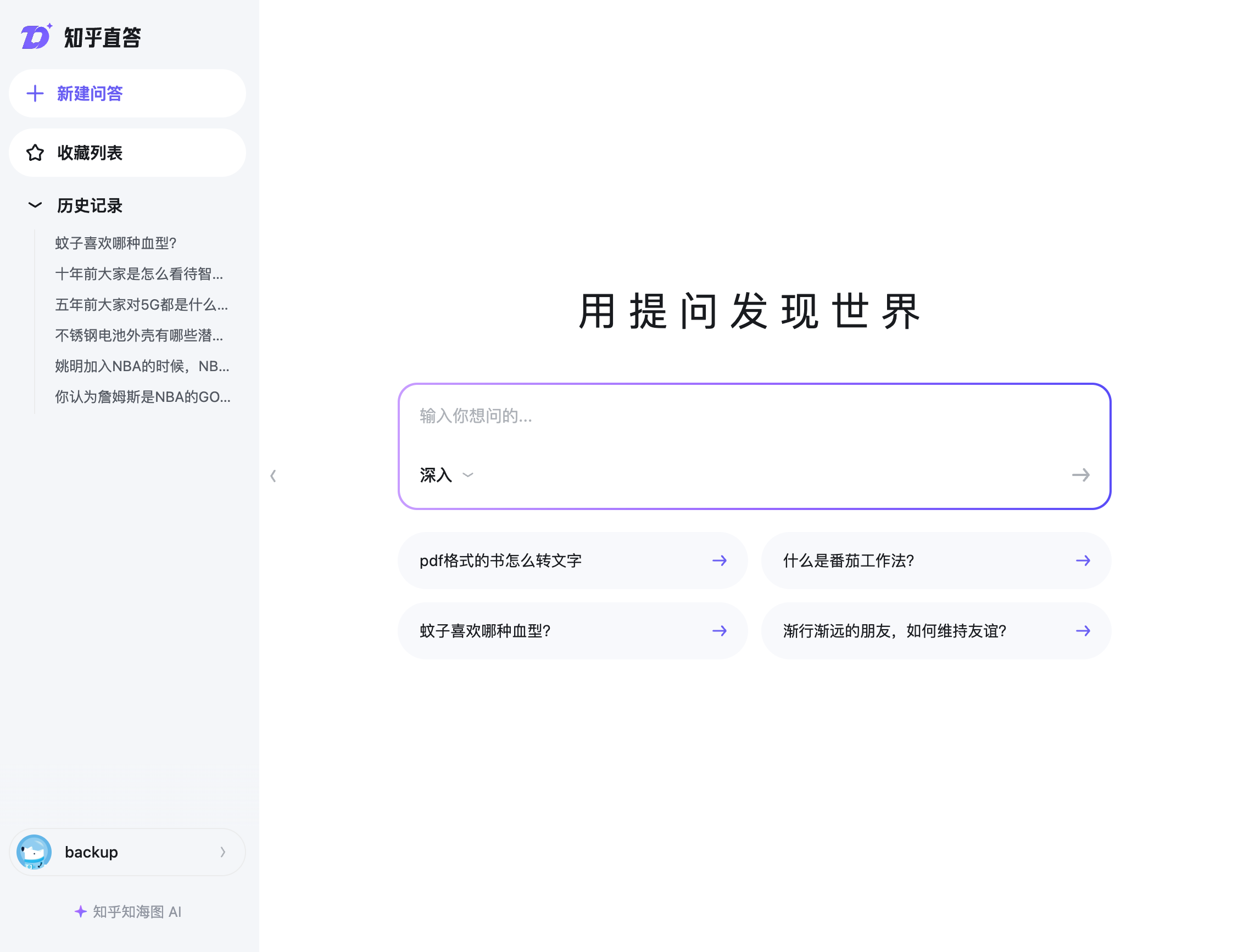
Image/Leitech
Entering the homepage, the central part is the most crucial question box, with recommended questions below as a guide for new users and a strategy to increase user stickiness. The sidebar contains a list of Q&A and user settings.
After entering a question, "Zhihu Direct Answer" also goes through the process of "understanding the question," "finding information," and then "generating an answer" and "completing the answer." After completing the answer, in addition to seeing the final presented answer content, you can also see the "reference source."
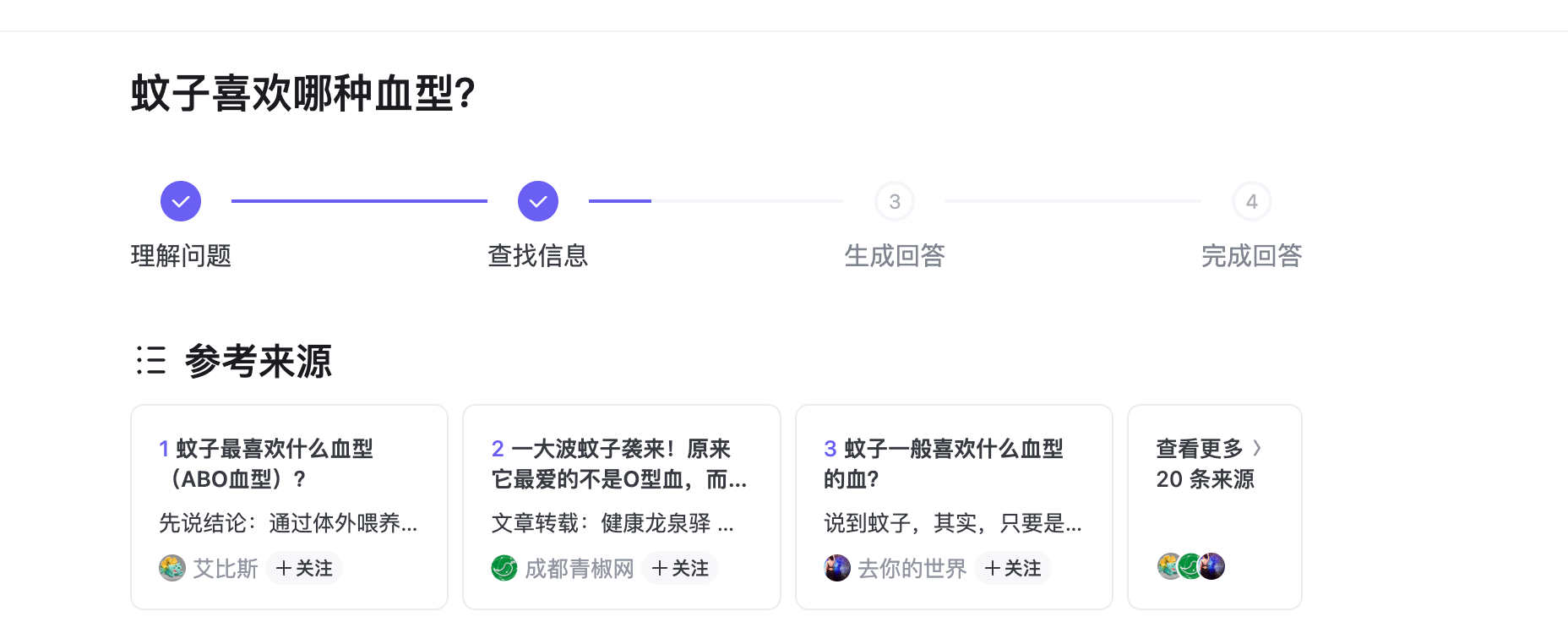
Image/Leitech
At the same time, you can continue to "dig deeper" and ask AI follow-up questions. For example, under the question of whether iPhone 16 plans to introduce a stainless steel battery case, I continued to ask, "Will other manufacturers use it?" AI can understand the context without needing to repeatedly mention "stainless steel battery case."
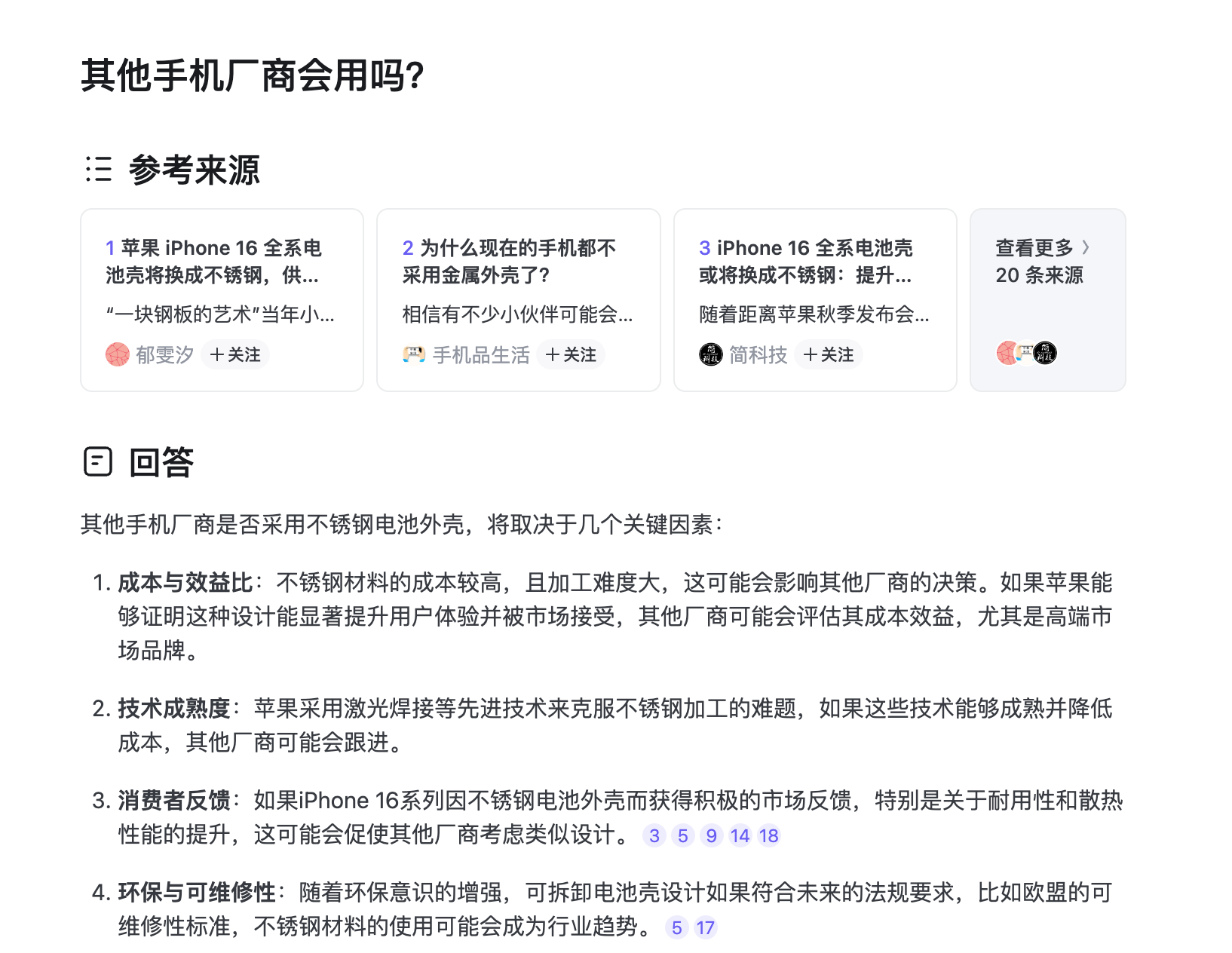
Image/Leitech
In addition to the default "in-depth" mode, users can also choose the "concise" mode to ask questions, as the name suggests, to output answers with fewer words each time.
And these basically constitute the "shell" of "Zhihu Direct Answer." Frankly speaking, it's not particularly surprising, but it can be considered a relatively mature design at this stage, with some details needing refinement, such as the pop-up position of the option window when selecting answer modes in follow-up questions.
However, as the saying goes, "Beautiful shells are all the same, but interesting souls are one in a million."
The core competitiveness of "Zhihu Direct Answer" comes from Zhihu's vast number of answers, which is not only one of the highest-quality and most important corpora on the Chinese internet but also a real-time updated database that gathers numerous user Q&As.
In brief, during the pre-training stage of the large model, the "Zhihai AI" large model used high-quality Zhihu Q&As as the core corpus for training. And in the practical application of "Zhihu Direct Answer," Zhihu is also used as the core database to "find information" and ultimately "generate answers" based on this.
But in the end, we still need to see the real deal.
Will Zhihu's answers become more reliable by using AI large models?
As everyone knows, one of the most powerful abilities of AI large models is their understanding of natural language, and one of the biggest advantages of AI search over traditional search is its ability to more accurately understand user intent.
From the perspective of "understanding the question," "Zhihu Direct Answer" does indeed reflect the advantages of AI large models to a certain extent. For example, when asked, "What is the difference between you and MiTa AI Search?" it can understand that I am asking about the difference between "Zhihu Direct Answer" and "MiTa AI Search" and compare them from perspectives such as functional positioning, technical characteristics, and user interaction.
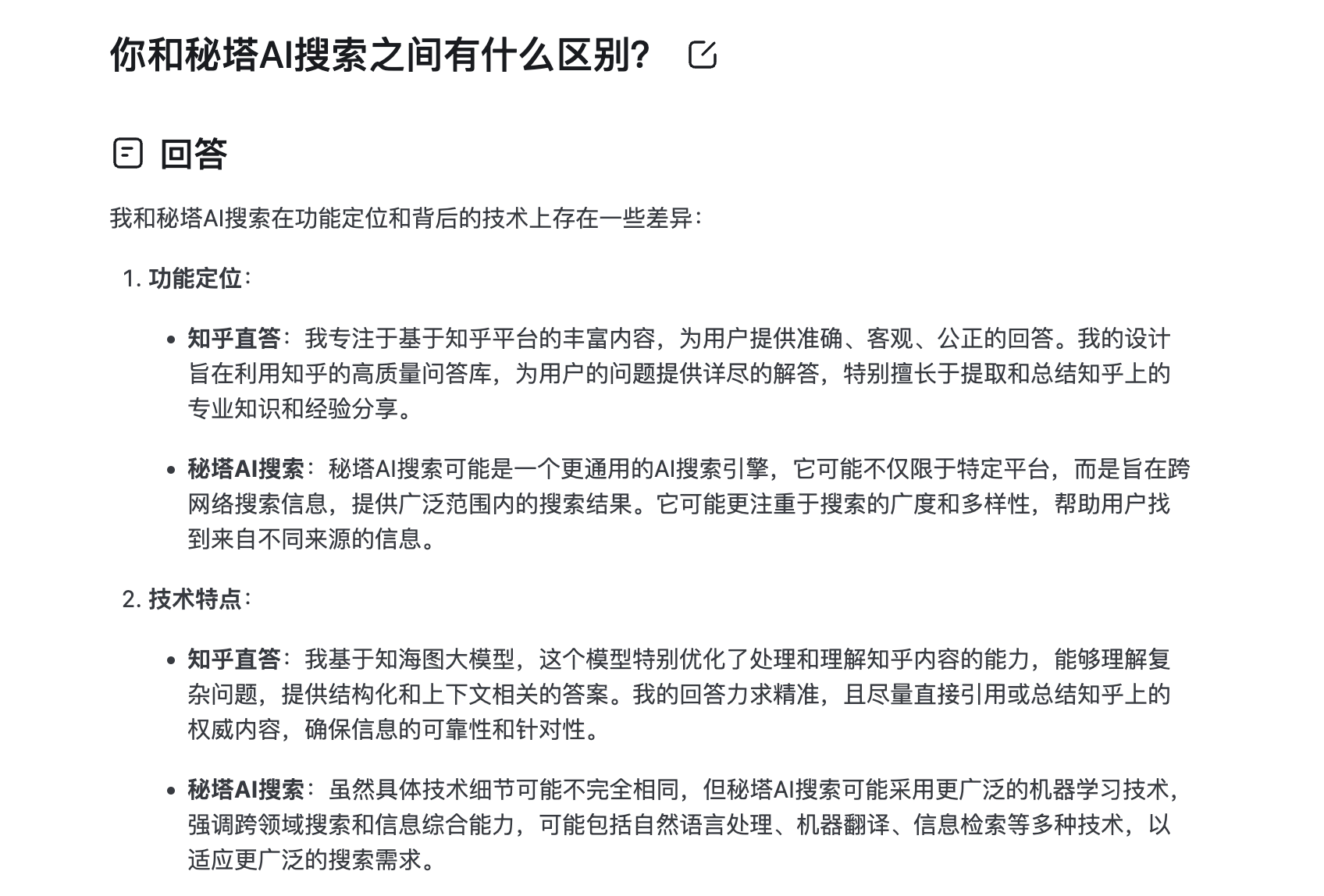
Image/Leitech
Even if presented with a Chinese-level 10 exam question asking "If a person is capable, they can succeed in any field they pursue; if not, they will fail regardless of the field," "Zhihu Direct Answer" can accurately understand the semantics.
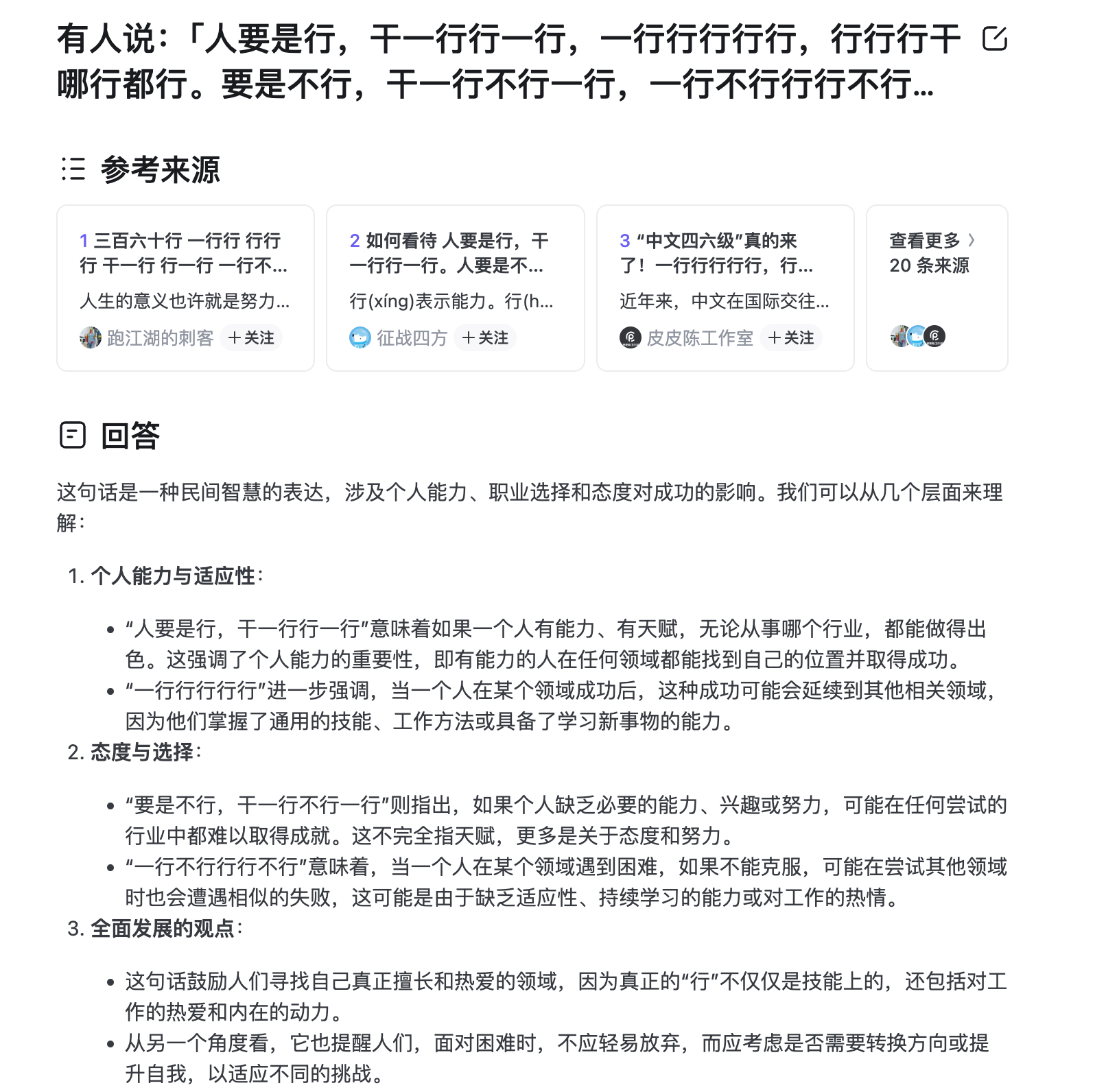
Image/Leitech
In addition, "Zhihu Direct Answer" can also understand based on context and knows some specialized terms in vertical fields. For example, when asked, "Is James the GOAT of the NBA?" it understands that James refers to LeBron James and that GOAT stands for the greatest player in NBA history.
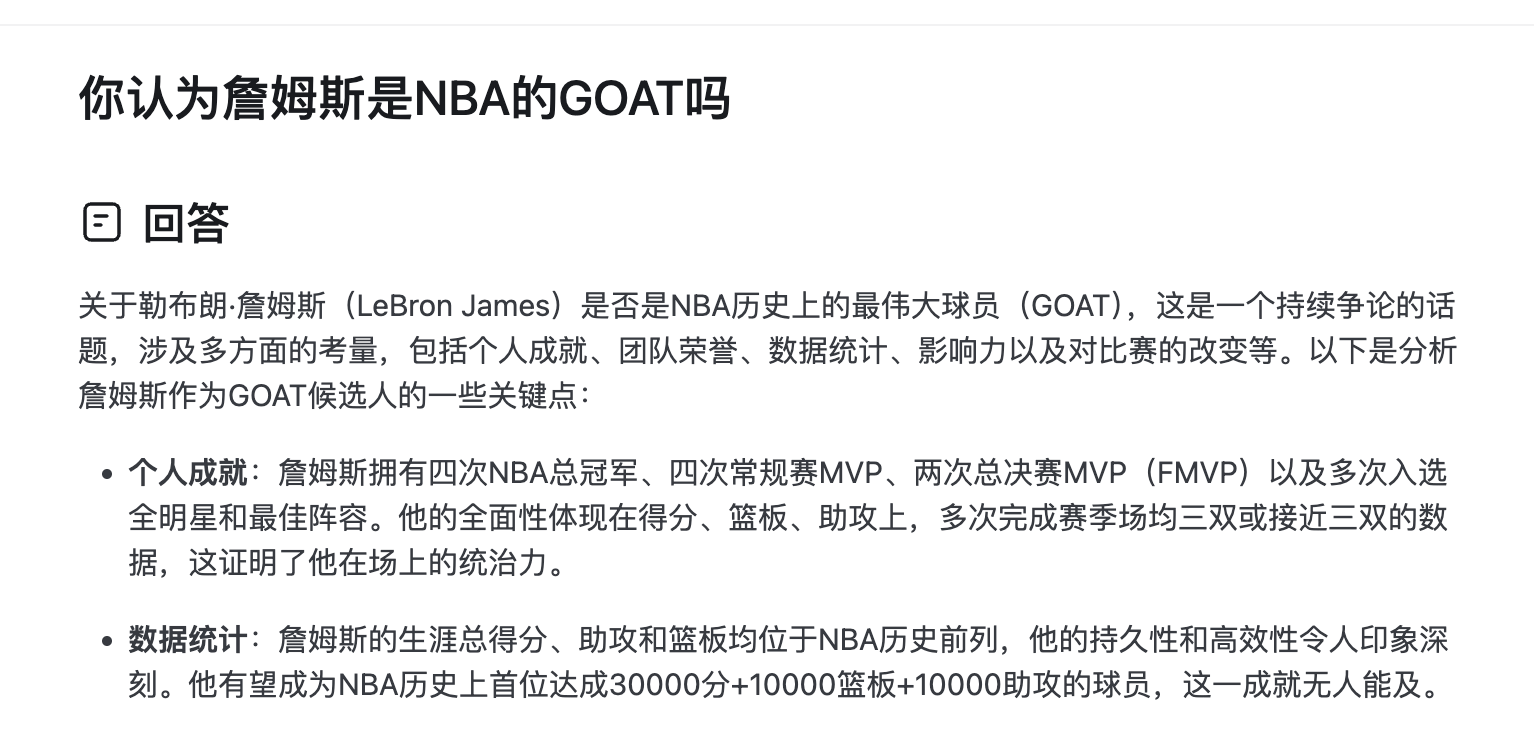
Image/Leitech
However, there seem to be some issues with "Zhihu Direct Answer" in time judgment. For example, asking about five years ago can accurately derive to 2019, but asking about ten years ago directly derives to 2012 (it should be 2014).
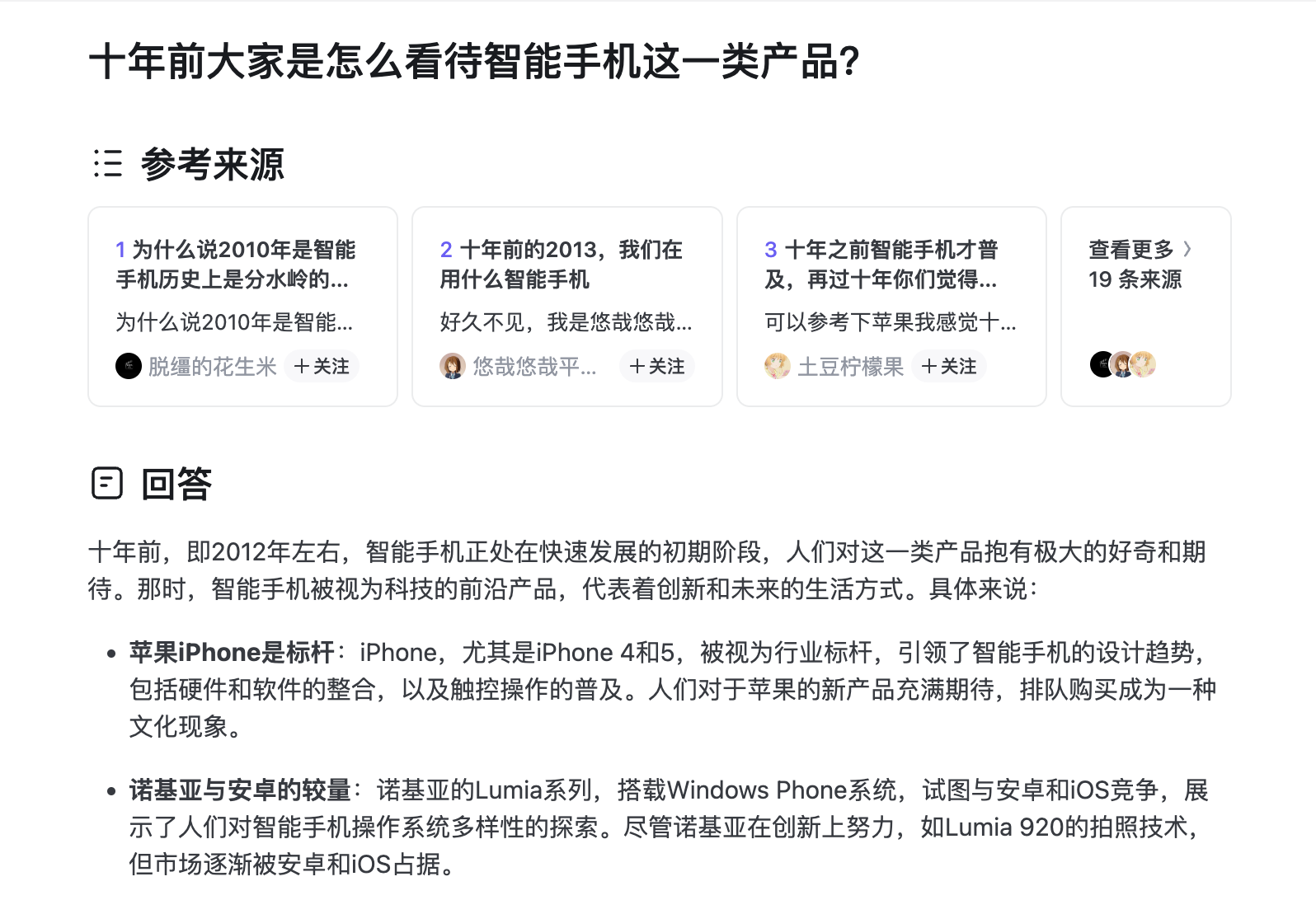
Image/Leitech
In addition, from the perspective of reference sources, there may also be issues with the logic of "Zhihu Direct Answer," which searches more with "ten years ago" as a keyword rather than "2012" or "2014" during the "finding information" process.
This also leads to the next step of "Zhihu Direct Answer" after understanding the question: finding information.
Compared to other AI large model products, the core technical difference of AI search lies in RAG (Retrieval-Augmented Generation) technology and real-time online generation of answers. In addition to retrieval capabilities, another key factor influencing the quality of large model generation is the database.
And compared to other AI searches, Zhihu happens to have a unique advantage - possibly the highest-quality on-site content in the Chinese world. At the same time, during the process of upgrading from the "Discovery·AI Search" feature to the "Zhihu Direct Answer" product, Zhihu did not limit itself to on-site content but expanded to retrievable content across the entire web.
For example, in the question of "What level is the C919 domestic large aircraft currently at," "Zhihu Direct Answer" not only found some answers from within the site but also accessed content from media reports, including Baidu Encyclopedia, The Paper, government websites, Xinhua News Agency, and other sources.
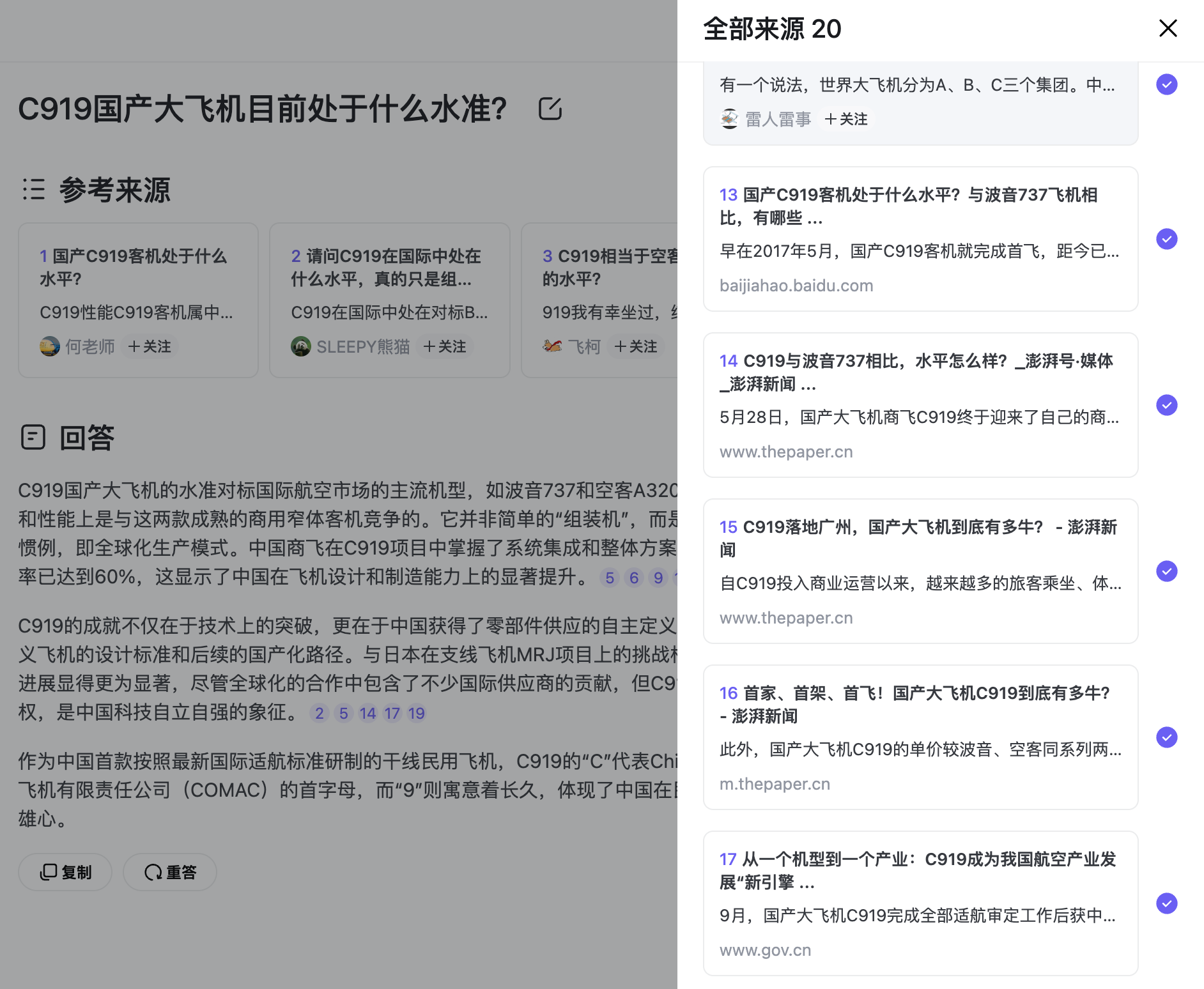
Image/Leitech
However, when we use "Zhihu Direct Answer," there will first be a question that many people are concerned about: Can "Zhihu Direct Answer" really use Zhihu's answers?
The simplest answer is: Yes, and it's truly traceable.
Taking the question of Apple's plan to introduce a stainless steel battery case as an example, the quality of "Zhihu Direct Answer's" first answer did not particularly surprise me, as it did not mention issues like the general increase in battery energy density or the impact of EU policies.
But "Zhihu Direct Answer" still answered Apple's reasons for introducing a stainless steel battery case from seven aspects, while directly indicating the source of citations in some places. Most of them are from Zhihu's in-site answers, with only two sources, 13 and 15, being external media reports.
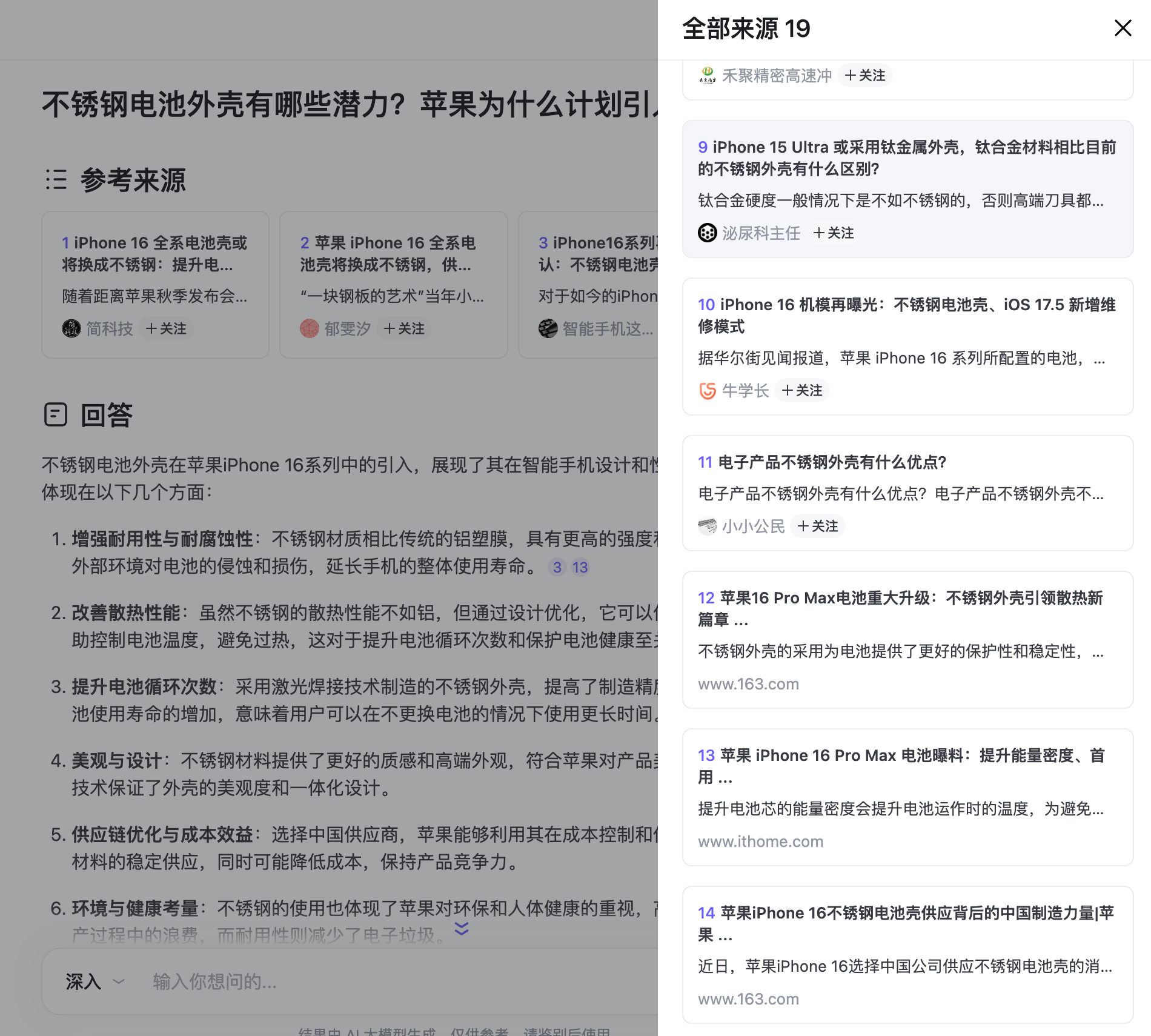
Image/Leitech
Clicking on these citation links indeed allows you to see the corresponding information and source of opinion. However, it's worth noting that citations are only partial. For example, in the "repair-friendly" section, the citation source only mentions the first half of the sentence, "The design of a stainless steel battery case may facilitate repairs."
As for the latter half about "iOS repair mode," it is not mentioned at all in the citation link, and is more of a "creation" by the large model.
In addition, although "Zhihu Direct Answer" boasts the ability to utilize the vast amount of high-quality content within the site, the quality of the in-site content that can be utilized varies significantly for different questions. Some Q&As themselves are of low quality, or even the answers are simply generated by AI.
This may also be one of the main reasons why Zhihu chose to expand its search range from within the site to the entire web.
But regardless, "Zhihu Direct Answer" ultimately aims to "generate answers." In this regard, thanks to the high-quality content within the site, "Zhihu Direct Answer" does perform relatively professionally in some fields, with more practical and less hollow answers.
Taking the C919 issue as an example, the answer from "MiTa AI Search" is more off-topic, and the conclusion is quite broad.
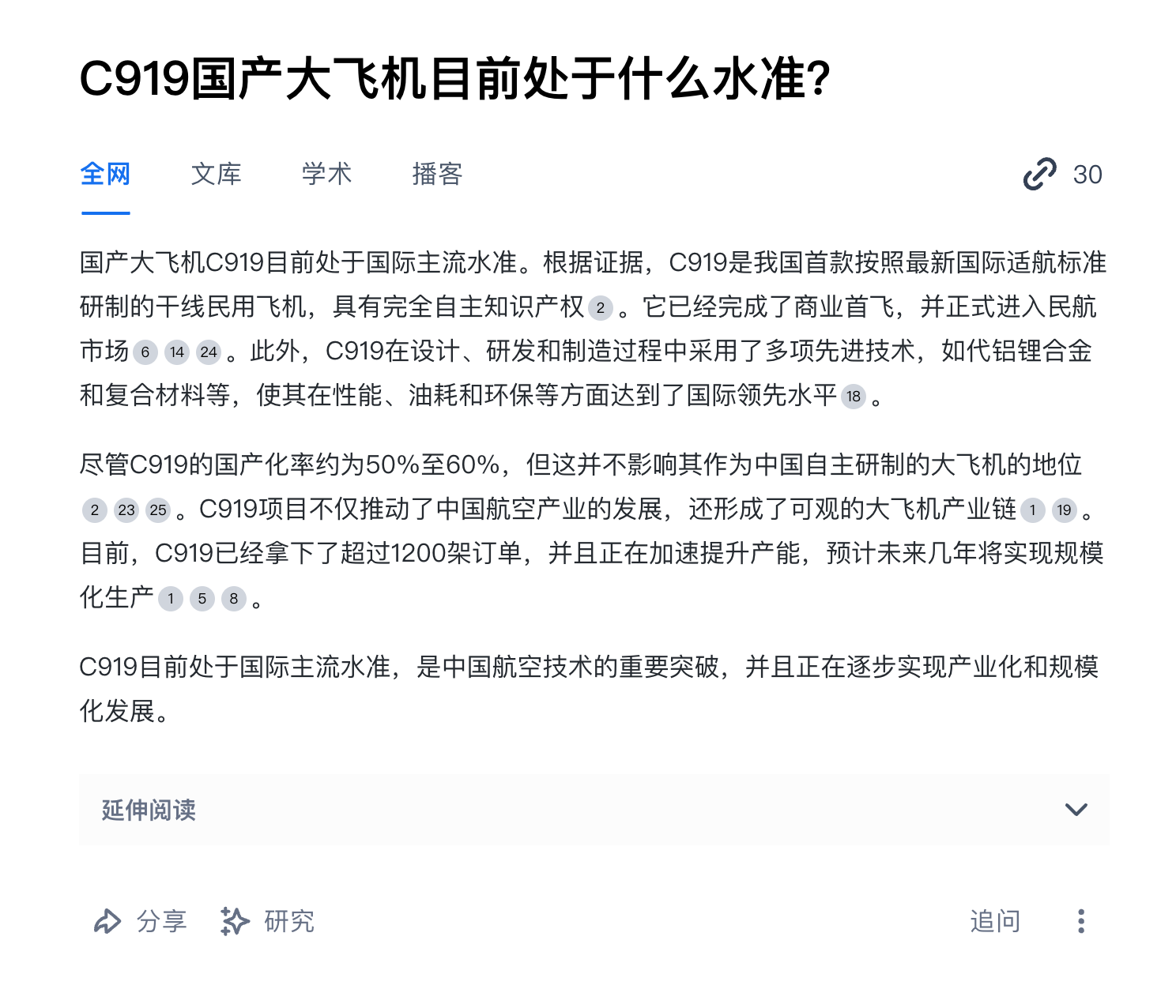
Answer from MiTa AI Search, Image/Leitech
The same question on "Zhihu Direct Answer" has a higher-quality answer, with relevant information and opinions that are substantive and can help users better understand the positioning, competitiveness, and significance of C919.
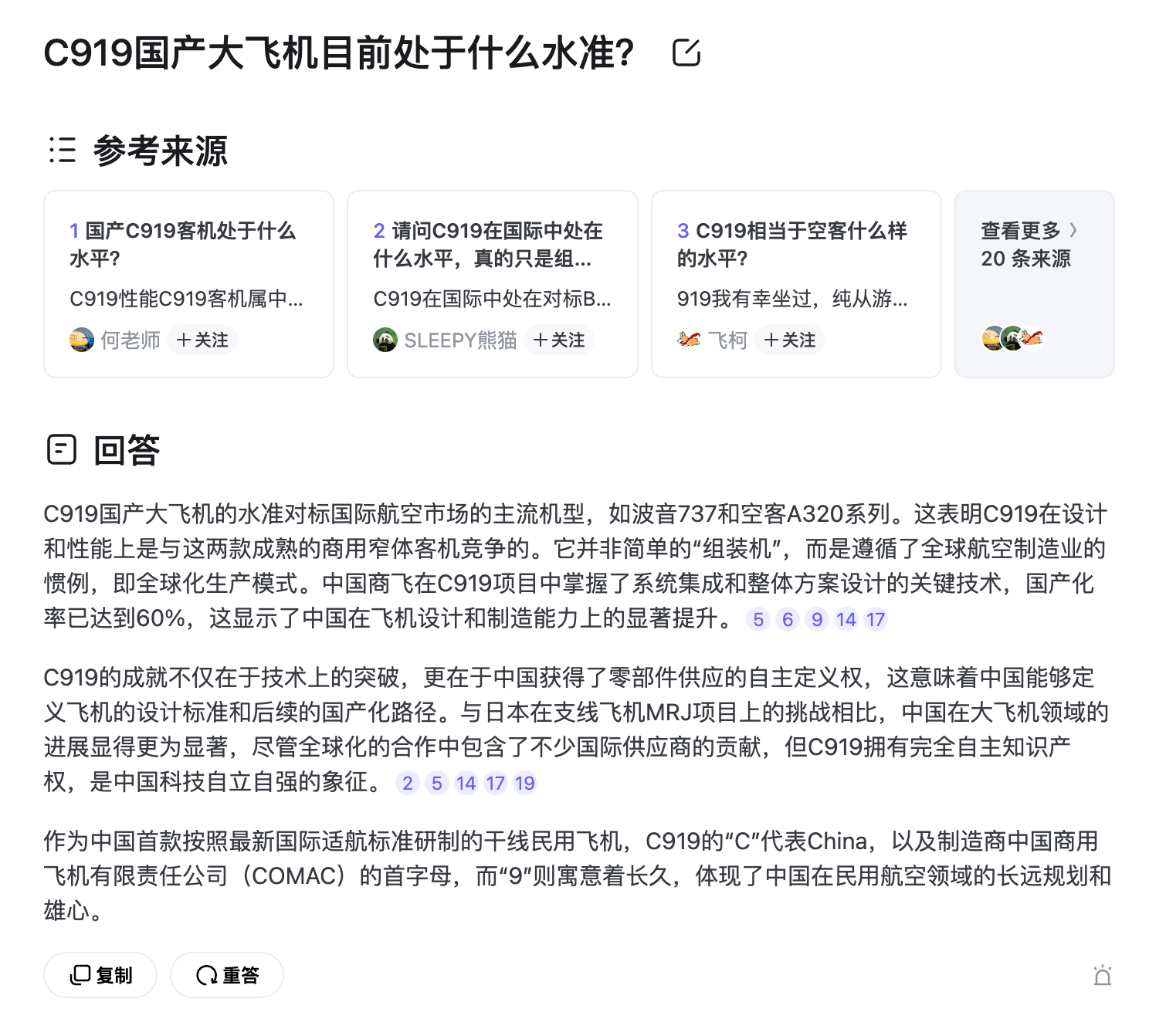
Answer from Zhihu Direct Answer, Image/Leitech
In addition, in the question of "What were people's views on 5G five years ago," "Zhihu Direct Answer" initially responded, "Five years ago, in 2019, people's views on 5G were diverse, filled with both expectations and some doubts." The subsequent opinions indeed reflect the different views on 5G on the Chinese internet at that time.
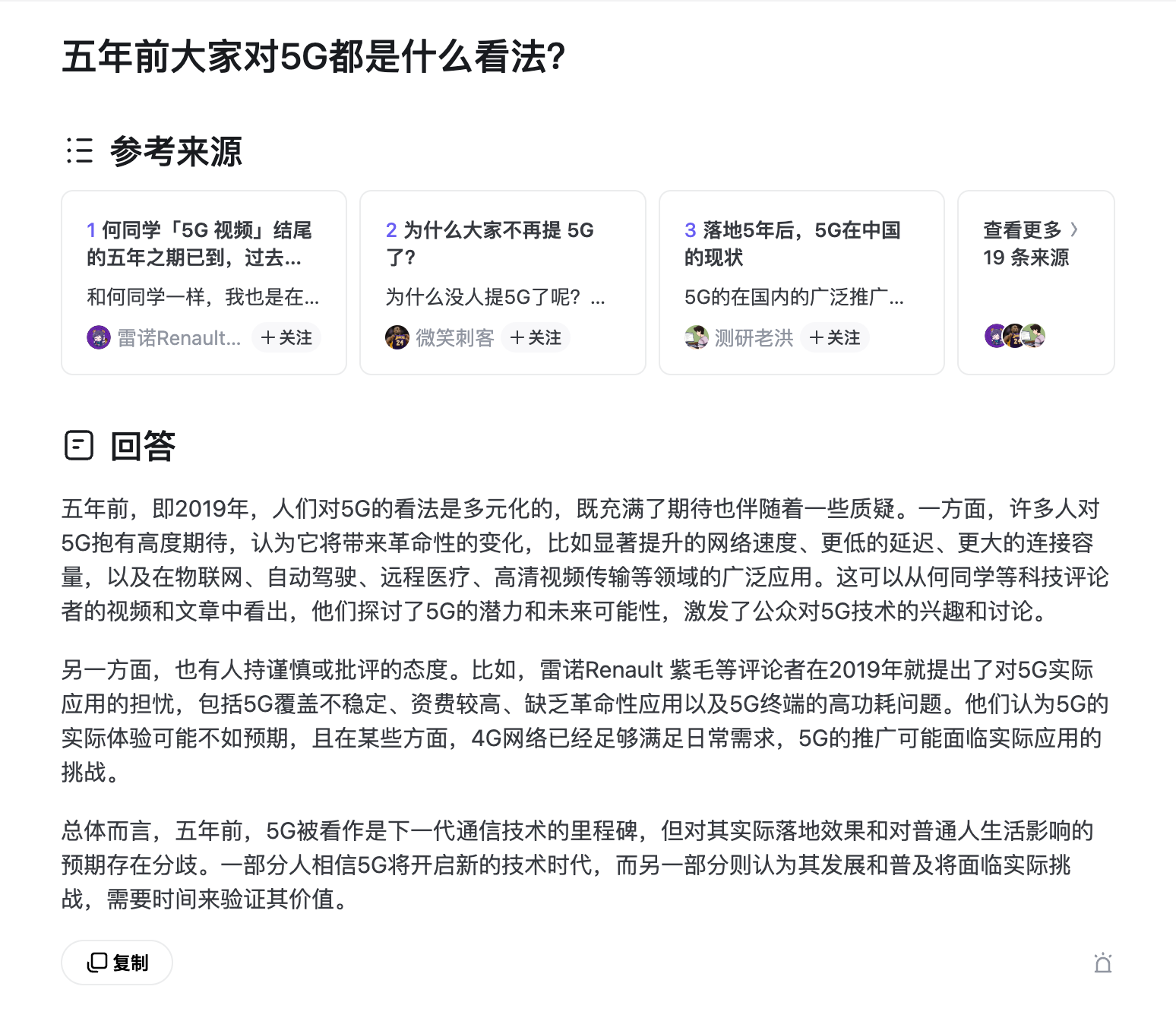
Image/Leitech
However, I also found some deficiencies in "Zhihu Direct Answer" on some issues.
For example, when asked, "Who was the coach of the NBA's Asian team when Yao Ming joined?" we can see that "Zhihu Direct Answer" knows that Yao Ming joined the NBA in 2002 but states that "there is no direct information indicating who the coach of the Asian team was the year Yao Ming joined the NBA."
However, if you continue to ask, "So who was the coach of the NBA's Asian team in 2002?" "Zhihu Direct Answer" can provide the correct derivation process and answer - Byron Scott, the then-head coach of the New Jersey Nets (now the Brooklyn Nets).
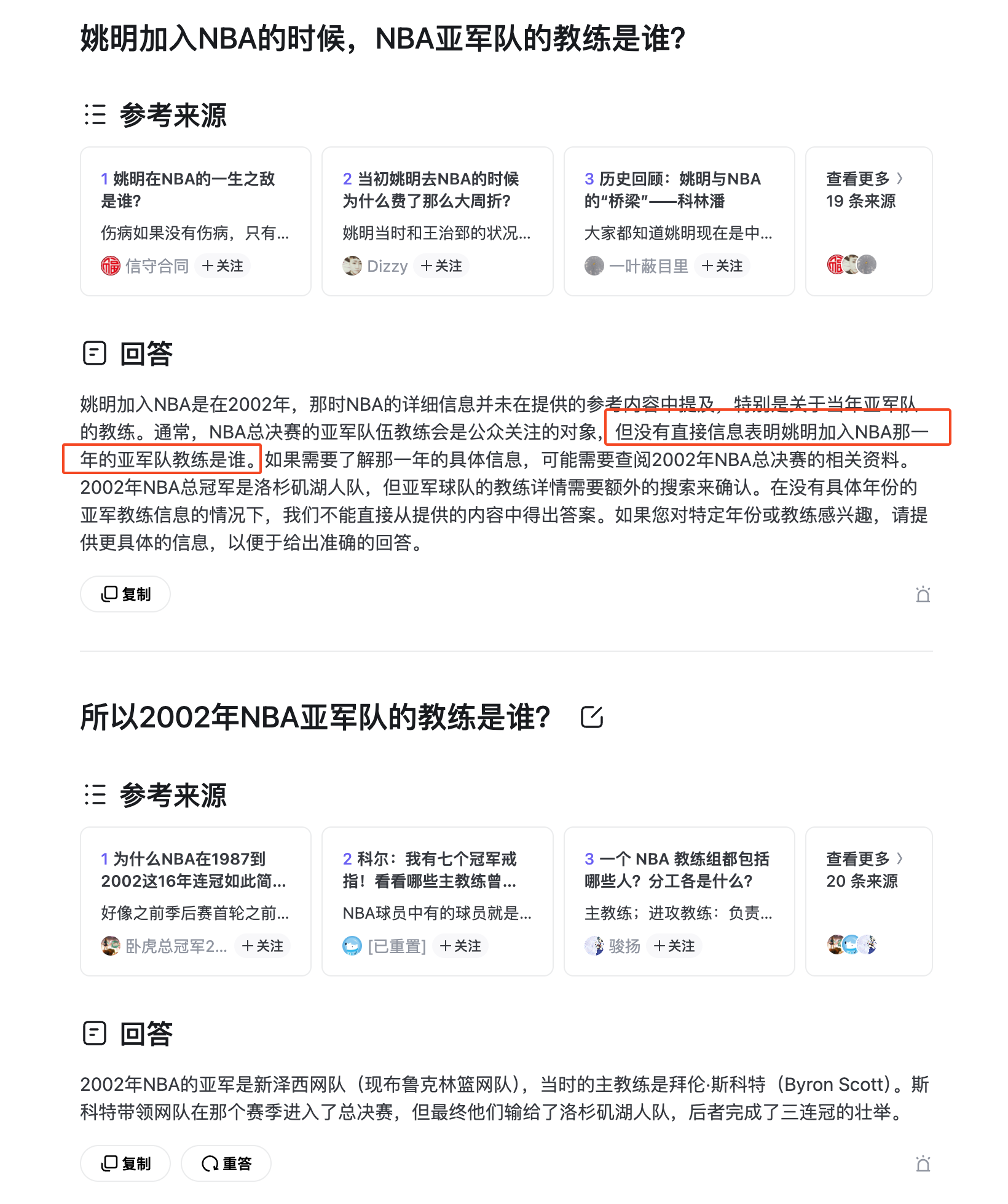
Image/Leitech
In other words, "Zhihu Direct Answer" is fully capable of directly providing the correct answer, but for some reason, it requires users to continue asking follow-up questions to obtain the final answer.
And in the follow-up questions about the stainless steel battery case, as the number of follow-up rounds increases, it can also affect "Zhihu Direct Answer's" ability to understand context. For example, in the fifth round of follow-up questions, directly asking, "What changes would there be if a stainless steel case were used?" the AI seems to forget that the previous context was centered around mobile phone batteries.
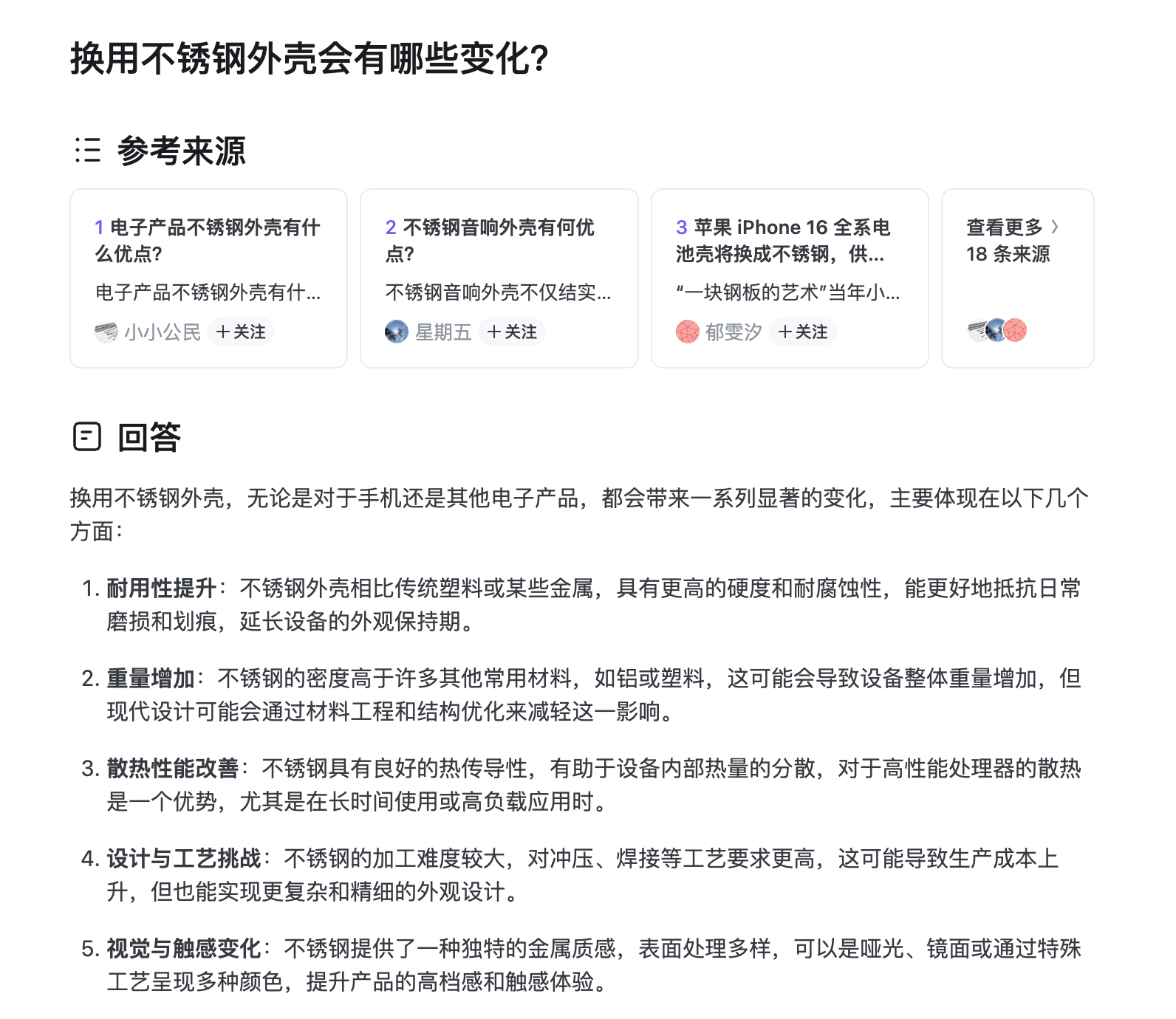
Image/Leitech
In the sixth round of follow-up questions, when I re-mentioned "mobile phone batteries," the AI was able to get back on track and provide answers based on mobile phone batteries.
In short, "Zhihu Direct Answer" can relatively easily combine context to understand new questions initially, but as the length of the context increases, this understanding ability may decline significantly.
In conclusion
Overall, among a range of AI large model products, "Zhihu Direct Answer" has indeed found some differentiated positioning, providing answers with higher information content and more traceable sources based on high-quality content within the site.
However, there are still issues, some of which can be resolved through techniques, such as clarifying the time rather than using "X years ago" as an input word, and appropriately emphasizing keywords in multiple rounds of Q&A. Others still require improvements to the underlying large model and technology, such as deeper understanding of user intent, weighting or filtering of reference sources, and more.
For now, if I know that some areas and topics have already been discussed brilliantly on Zhihu, I would indeed prefer to use "Zhihu Direct Answer" to quickly and conveniently understand and delve into them.
But will I use "Zhihu Direct Answer" to a greater extent as a daily channel for obtaining information and opinions? It depends on the subsequent improvements to the model and product. I believe there is still hope, just as the official account of Zhihu Direct Answer responded in a question about "Zhihu Direct Answer":
The AI era has only just begun, and the road ahead is still long.





